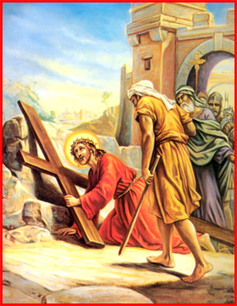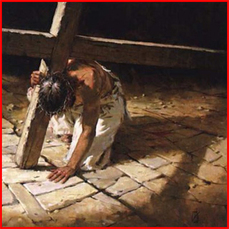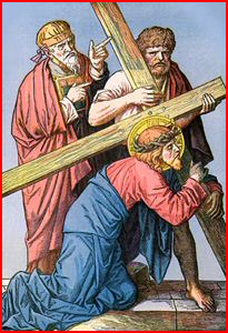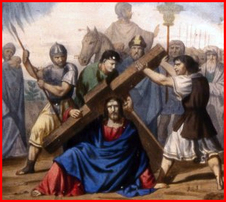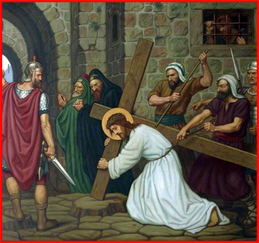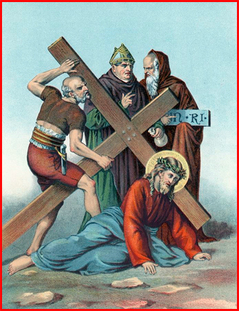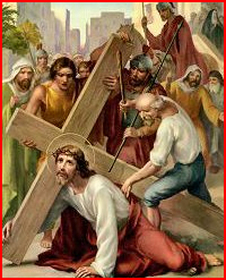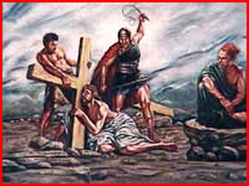| Devotion to Our Lady |
|
- Homepage
-
Daily Thoughts
- 2023 October Daily Thoughts
- Daily Thoughts Lent 2020
- Daily Thoughts for Advent 2019
- Daily Thoughts for October 2019
- Daily Thoughts for September 2019
- Daily Thoughts for August 2019
- Daily Thoughts for July
- Daily Thoughts for June
- Daily Thoughts for Easter 2019
- Daily Thoughts for Lent 2019
- Daily Thoughts for Christmas
- Daily Thoughts Easter 2022
- Sacred Heart
- Holy Ghost
-
Spiritual Life
- Holy Mass Explained
- First Friday Devotions
- First Saturday Devotions
- The Mercy of God
- Vocations
- The Path Everyone Must Walk >
- Gift of Failure
- Halloween or Hell-O-Ween?
- Ignatian Spiritual Exercises >
- Meditation is Soul-Saving
- Spiritual Communion
- Miraculous Medal
- Enrollment in Miraculous Medal
- St. Benedict Medal
- Holy Water
- Advice on Prayer
- Your Daily Mary
-
Prayers
- September Devotions
- Seven Sorrows of Our Lady
-
Novenas
>
- NV-Help of Christians
- NV-Nativity of Our Lady
- NV-Seven Sorrows
- NV- Sorrowful Heart
- NV-Pope St Pius X
- NV-La Salette
- NV-St Michael Archangel
- NV-Immaculate Heart
- NV-Assumption
- NV-Novena for Fathers
- NV-Novena for Your Mother
- NV-St Raphael Archangel
- NV-Souls in Purgatory
- NV-All Saints Day
- NV-Christ the King
- NV-Divine Motherhood
- NV-Guardian Angels
- NV-Rosary
- NV-Mirac Med
- NV- Imm Conc
- NV - Guadalupe
- NV - Nativity of Jesus
- NV-Epiphany
- NV-OL Good Success
- NV-Lourdes
- NV-St Patrick
- NV-St Joseph
- NV-Annunciation
- NV-St Louis de Montfort
- NV-OL Good Counsel
- NV-Last Supper
- NV-Passion
- NV-Pentecost
- NV-Ascension
- NV-Sacred Heart
- NV-Sacred Heart & Perpetual Help
- NV-Corpus Christi
- NV-OL of Perpetual Help
- NV-Queenship BVM
- NV-OL of Mount Carmel
- NV-St Mary Magdalen
- NV- Im Hrt
- August Devotions to IHM
- Immaculate Heart of Mary
- Litany of Dependence
- Prayers to St Mary Magdalen
- Prayers in Times of Sickness Disease & Danger
- Holy Souls in Purgatory
- Meditations on the Litany of Our Lady
- Special Feast Days
- Prayers to Mary (Mon-Sun)
- Litanies to Our Lady >
- Various & Special Needs
- Our Lady of the Rosary
- Our Lady of Mt. Carmel
- Our Lady of Perpetual Help
- Our Lady of Guadalupe
- Other titles of Our Lady
-
Rosary
- Downloads
- Consecration
- Easter Season
-
Holy Week
- Last Seven Words of Jesus >
- Characters of Passion >
- The Last Days of Christ
- Before Palm Sunday
- Palm Sunday
- Monday in Holy Week
- Tuesday in Holy Week
- Wednesday in Holy Week
- Holy Thursday (Last Supper)
- Holy Thursday (Agony & Arrest)
- Night Vigil with Christ
- Good Friday (Pilate & Herod)
- Good Friday (Way of Cross & Crucifixion)
- Saturday in Holy Week
-
Lent
- Ideas for Lent
- Daily Lenten Planner
- Daily Lenten Liturgy
- From Cold to Hot
- Lent with Aquinas
- Lent with Dom Gueranger
- Virtues for Lent
- History of Penance
- How Expensive is Sin?
- Confession of Sins
- Letter to Friends of the Cross
- Sermons for Lent
- Stations of the Cross >
- Lenten Prayers
- 7 Penitential Psalms
- Lenten Psalms SUN
- Lenten Psalms MON
- Lenten Psalms TUE
- Lenten Psalms WED
- Lenten Psalms THU
- Lenten Psalms FRI
- Lenten Psalms SAT
- Lenten Laughs
- Septuagesima
-
Christmas
- Epiphany Explained
- Suggestions for Christmas
- Food For Thought
- Christmas with Aquinas
- Christmas with Dom Gueranger
- Christmas Prayers
- Candles & Candlemas
- Christmas Sermons
- Christmas Prayers SUN
- Christmas Prayers MON
- Christmas Prayers TUE
- Christmas Prayers WED
- Christmas Prayers THU
- Christmas Prayers FRI
- Christmas Prayers SAT
- Twelve Days of Christmas >
-
Advent Journey
- Purgatory
- Christ the King
- Legion of Mary
- Scapular
-
Saints
-
Martyrs for the Faith
>
- Your Daily Martyr >
- All 365 Days of Martyrs
- Cristeros
- St Valentine & Valentine's Day
- Martyrs--Thomas Becket
- Martyrs--John the Apostle
- Holy Machabees
- Age of Martyrdom
- Carmelites of Compiegne
- Martyrs--Peter & Paul
- Martyrs--John the Baptist
- Martyrs--Andrew
- Martyrs--James the Great
- Martyrs--North American
- Martyrs--Seven Holy Sleepers
- Martyrs--Afra
- School of Martyrdom
- Martyrs--Christina
- Desert Saints >
- Saints for Sinners >
- Saints of Mary >
- History of All Saints Day
-
Martyrs for the Faith
>
- Precious Blood
- Synod 2023
-
Catechism
- Catechism Lesson 1
- Catechism Lesson 2
- Catechism Lesson 3
- Catechism Lesson 4
- Catechism Lesson 5
- Catechism Lesson 6
- Catechism Lesson 7
- Catechism Lesson 8
- Catechism Lesson 9
- Catechism Lesson 10
- Catechism Lesson 11
- Catechism Lesson 12
- Catechism Lesson 13
- Catechism Lesson 14
- Catechism Lesson 15
- Catechism Lesson 16
- Catechism Lesson 17
- Catechism Lesson 18
- Catechism Lesson 19
- Catechism Lesson 20
- Catechism Lesson 21
- Catechism Lesson 22
- Bible Study
-
Calendar
- Miracles
- Apparitions
- Shrines
- Prophecies
- Angels Homepage
- Hell
-
Church Crisis
- Conspiracy Theories
- Amazon Synod 2019 >
- Liberalism & Modernism
- Modernism--Encyclical Pascendi
- Modernism & Children
- Modernism--Documents
- The Francis Pages
- Church Enemies on Francis
- Francis Quotes
- Amoris Laetitia Critique
- Danger of Ignorance (Pius X)
- Restore all In Christ (Pius X)
- Catholic Action (Pius X)
- Another TITANIC Disaster?
- The "Errors of Russia"
- CRISIS PRAYERS
- Election Novena 2024
- The Anger Room
- War Zone
- Life of Mary
- Spiritual Gym
- Stupidity
- Coronavirus and Catholicism
- History & Facts
- Books
- Catholic Family
- Children
- Daily Quiz
-
Novena Church & Pope
- Day 01 Church-Pope Novena
- Day 02 Church-Pope Novena
- Day 03 Church-Pope Novena
- Day 04 Church-Pope Novena
- Day 05 Church-Pope Novena
- Day 06 Church-Pope Novena
- Day 07 Church-Pope Novena
- Day 08 Church-Pope Novena
- Day 09 Church-Pope Novena
- Day 10 Church-Pope Novena
- Day 11 Church-Pope Novena
- Day 12 Church-Pope Novena
- Day 13 Church-Pope Novena
- Day 14 Church-Pope Novena
- Day 15 Church-Pope Novena
- Day 16 Church-Pope Novena
- Day 17 Church-Pope Novena
- Day 18 Church-Pope Novena
- Day 19 Church-Pope Novena
- Day 20 Church-Pope Novena
- Day 21 Church-Pope Novena
- Day 22 Church-Pope Novena
- Day 23 Church-Pope Novena
- Day 24 Church-Pope Novena
- Day 25 Church-Pope Novena
- Day 26 Church-Pope Novena
- Day 27 Church-Pope Novena
- Day 28 Church-Pope Novena
- Day 29 Church-Pope Novena
- Day 30 Church-Pope Novena
- Day 31 Church-Pope Novena
- Day 32 Church-Pope Novena
- Day 33 Church-Pope Novena
- Day 34 Church-Pope Novena
- Day 35 Church-Pope Novena
- Day 36 Church-Pope Novena
- Day 37 Church-Pope Novena
- Day 38 Church-Pope Novena
- Day 39 Church-Pope Novena
- Day 40 Church-Pope Novena
- Day 41 Church-Pope Novena
- Day 42 Church-Pope Novena
- Day 43 Church-Pope Novena
- Day 44 Church-Pope Novena
- Day 45 Church-Pope Novena
- Day 46 Church-Pope Novena
- Day 47 Church-Pope Novena
- Day 48 Church-Pope Novena
- Day 49 Church-Pope Novena
- Day 50 Church-Pope Novena
- Day 51 Church-Pope Novena
- Day 52 Church-Pope Novena
- Day 53 Church-Pope Novena
- Day 54 Church-Pope Novena
- Penance Novena
- Daily WeAtheR Forecast
| 1st Station | 2nd Station | 3rd Station | 4th Station | 5th Station | 6th Station | 7th Station |
| 8th Station | 9th Station | 10th Station | 11th Station | 12th Station | 13th Station | 14th Station |
| 8th Station | 9th Station | 10th Station | 11th Station | 12th Station | 13th Station | 14th Station |
The Greatest and Most Important Time in the Church's Liturgical Year
CLICK ON ANY LINK BELOW
Also lots of LENTEN & HOLY WEEK DOWNLOADS on the downloads page (click here)
LENTEN PAGES
| ASH WEDNESDAY COUNTDOWN | LENT (MAIN PAGE) | DAILY THOUGHTS | DAILY LENTEN LITURGY | DAILY LENTEN PLANNER |
| LENTEN PRAYERS | THE 7 PENITENTIAL PSALMS | IDEAS FOR PENANCE | LENT WITH AQUINAS | LENT WITH DOM GUERANGER |
| HISTORY OF PENANCE | PENANCES OF THE SAINTS | HOW EXPENSIVE IS SIN? | CONFESSION OF SINS | ARE FEW SOULS SAVED? |
| VIRTUES FOR LENT | FROM COLD TO HOT | LENTEN LAUGHS | | SERMONS FOR LENT | LETTER TO FRIENDS OF THE CROSS |
| STATIONS OF THE CROSS (INDIVIDUALLY) | ALL 14 STATIONS OF THE CROSS | LITANIES FOR PASSIONTIDE |
| THE LAST DAYS OF CHRIST | SPECIAL HOLY WEEK PAGES |
LITURGICAL PRAYERS FOR EACH DAY OF THE WEEK DURING LENT
| Sundays of Lent | Mondays of Lent | Tuesdays of Lent | Wednesdays of Lent | Thursdays of Lent | Fridays of Lent | Saturdays of Lent |
HOLY WEEK PAGES
| Holy Week Main Page | Before Palm Sunday | Palm Sunday | The Last Days of Christ | Holy Thursday Last Supper Novena | Good Friday Passion Novena |
| Monday of Holy Week | Tuesday of Holy Week | Wednesday of Holy Week | Holy Thursday (Last Supper) | Holy Thursday (Agony & Arrest) |
| Night Vigil With Christ | Good Friday (Pilate & Herod) | Good Friday (Way of Cross & Crucifixion) | Holy Saturday |
THE CHIEF CHARACTERS OF THE PASSION
| Characters of the Passion Mainpage | The Sanhedrin | Pharisees | Scribes | Saducees | Jewish Crowd | Roman Rulers |
| Judas | Annas & Caiphas | Pontius Pilate | Herod | Barabbas | Dismas the Good Thief | St. Peter | St. John | Mary Magdalen |
THE FOURTEEN STATIONS OF THE CROSS
| Introduction to the Stations of the Cross | Short Version of the Stations of the Cross (all 14 on one page) | 1st Station | 2nd Station | 3rd Station |
| 4th Station | 5th Station | 6th Station | 7th Station | 8th Station | 9th Station | 10th Station | 11th Station | 12th Station | 13th Station | 14th Station |
THE LAST SEVEN WORDS OF JESUS FROM THE CROSS
| Seven Last Words on the Cross (Introduction) | The 1st Word on the Cross | The 2nd Word on the Cross | The 3rd Word on the Cross |
| The 4th Word on the Cross | The 5th Word on the Cross | The 6th Word on the Cross | The 7th Word on the Cross |
PRAYERS AND DEVOTIONS TO THE SEVEN SORROWS OF OUR LADY
| Seven Sorrows Meditations | Short Prayers & Short Seven Sorrows Rosary | Longer Seven Sorrows Rosary |
| 1st Sorrow of Our Lady | 2nd Sorrow of Our Lady | 3rd Sorrow of Our Lady | 4th Sorrow of Our Lady |
| 5th Sorrow of Our Lady | 6th Sorrow of Our Lady | 7th Sorrow of Our Lady |
| Novena #1 to the Sorrowful Heart of Mary | Novena #2 to the Sorrowful Heart of Mary |
CLICK ON ANY LINK BELOW
Also lots of LENTEN & HOLY WEEK DOWNLOADS on the downloads page (click here)
LENTEN PAGES
| ASH WEDNESDAY COUNTDOWN | LENT (MAIN PAGE) | DAILY THOUGHTS | DAILY LENTEN LITURGY | DAILY LENTEN PLANNER |
| LENTEN PRAYERS | THE 7 PENITENTIAL PSALMS | IDEAS FOR PENANCE | LENT WITH AQUINAS | LENT WITH DOM GUERANGER |
| HISTORY OF PENANCE | PENANCES OF THE SAINTS | HOW EXPENSIVE IS SIN? | CONFESSION OF SINS | ARE FEW SOULS SAVED? |
| VIRTUES FOR LENT | FROM COLD TO HOT | LENTEN LAUGHS | | SERMONS FOR LENT | LETTER TO FRIENDS OF THE CROSS |
| STATIONS OF THE CROSS (INDIVIDUALLY) | ALL 14 STATIONS OF THE CROSS | LITANIES FOR PASSIONTIDE |
| THE LAST DAYS OF CHRIST | SPECIAL HOLY WEEK PAGES |
LITURGICAL PRAYERS FOR EACH DAY OF THE WEEK DURING LENT
| Sundays of Lent | Mondays of Lent | Tuesdays of Lent | Wednesdays of Lent | Thursdays of Lent | Fridays of Lent | Saturdays of Lent |
HOLY WEEK PAGES
| Holy Week Main Page | Before Palm Sunday | Palm Sunday | The Last Days of Christ | Holy Thursday Last Supper Novena | Good Friday Passion Novena |
| Monday of Holy Week | Tuesday of Holy Week | Wednesday of Holy Week | Holy Thursday (Last Supper) | Holy Thursday (Agony & Arrest) |
| Night Vigil With Christ | Good Friday (Pilate & Herod) | Good Friday (Way of Cross & Crucifixion) | Holy Saturday |
THE CHIEF CHARACTERS OF THE PASSION
| Characters of the Passion Mainpage | The Sanhedrin | Pharisees | Scribes | Saducees | Jewish Crowd | Roman Rulers |
| Judas | Annas & Caiphas | Pontius Pilate | Herod | Barabbas | Dismas the Good Thief | St. Peter | St. John | Mary Magdalen |
THE FOURTEEN STATIONS OF THE CROSS
| Introduction to the Stations of the Cross | Short Version of the Stations of the Cross (all 14 on one page) | 1st Station | 2nd Station | 3rd Station |
| 4th Station | 5th Station | 6th Station | 7th Station | 8th Station | 9th Station | 10th Station | 11th Station | 12th Station | 13th Station | 14th Station |
THE LAST SEVEN WORDS OF JESUS FROM THE CROSS
| Seven Last Words on the Cross (Introduction) | The 1st Word on the Cross | The 2nd Word on the Cross | The 3rd Word on the Cross |
| The 4th Word on the Cross | The 5th Word on the Cross | The 6th Word on the Cross | The 7th Word on the Cross |
PRAYERS AND DEVOTIONS TO THE SEVEN SORROWS OF OUR LADY
| Seven Sorrows Meditations | Short Prayers & Short Seven Sorrows Rosary | Longer Seven Sorrows Rosary |
| 1st Sorrow of Our Lady | 2nd Sorrow of Our Lady | 3rd Sorrow of Our Lady | 4th Sorrow of Our Lady |
| 5th Sorrow of Our Lady | 6th Sorrow of Our Lady | 7th Sorrow of Our Lady |
| Novena #1 to the Sorrowful Heart of Mary | Novena #2 to the Sorrowful Heart of Mary |
THE THIRD STATION : JESUS FALLS FOR THE FIRST TIME
“St. Augustine assures us that there is no spiritual exercise more fruitful or more useful than the frequent reflection on the sufferings of Our Lord. St. Albert the Great, who had St. Thomas Aquinas as his student, learned in a revelation that by simply thinking of or meditating on the Passion of Jesus Christ, a Christian gains more merit than if he had fasted on bread and water every Friday for a year, or had beaten himself with the discipline once a week till blood flowed, or had recited the whole Book of Psalms every day” (The Secret of the Rosary, St. Louis Marie de Montfort, “Twenty-Eighth Rose”).
|
From Fort Antonia to the knoll of Calvary the distance was barely half a mile. The route wound in and out among the narrow lanes across the North of the city, almost due west from the house of Pilate, creeping first along the northern wall of the Temple, dropping down into the Tyropcean valley, then up again by a street of many steps, and through the bazaar towards the Tower of David. At ordinary times it was at most a walk of a quarter of an hour; with Jesus in His present plight, weakened by the loss of blood and with the weight of the wood upon His shoulders, it may well have been a much more.
As the procession moved through the crowded streets, the rest of the city went about its ordinary business. It was the eve of the Paschal Sabbath, and preparations of all kinds had to be made. Many pilgrims from abroad filled every quarter, and the sellers of food, the money-changers, the dealers in whatever might attract a stranger's notice, could not lose the opportunity. There were droves of animals being brought into the Temple from the country; altogether this was not a day on which much interest would be taken by ordinary people in such a thing as a common execution. Not even the attendance of so many priests and elders would avail to attract them; as he looked at them lazily and unconcernedly from his booth or counter, many a squatting shopkeeper would tell himself; with a hidden sneer though his face remained a blank, that here was another victim of these merciless men, this time being hounded to death. Some would ask their neighbours who was this Man who was evidently so hated; and they would be told that He was one who had called the scribes and Pharisees a “wicked and adulterous generation,” who had cried “Woe” upon them for their injustice and hypocrisy, who had said that their power would be taken from them, and would be given to another. This was He who had called Himself the Light of the World, the Good Shepherd, the Life of men, the Son of God; who, it was true, had done nothing but good, but who had claimed for Himself such rights and titles as no scribe or Pharisee could tolerate. He had been accused of perverting the nation, of stirring up the people, of making all the world go after Him; the Roman Governor had condemned Him for making Himself a king. Such men were better out of the way; they disturbed the peace, they interrupted trade. Commercial Jerusalem had its own working creed; it had little use for fanatics or bigots. So we may be sure the talk passed from mouth to mouth as the procession moved through the streets. It turned into the main thoroughfare which came into the city by the Damascus Gate. How often had Jesus come to and gone from Jerusalem by that route! It was the ordinary road from Nazareth, through Samaria and the Judaean upland; when He had come annually to the Temple, when He had gone through Samaria to Cana, and had met the woman at the Well of Jacob, when He had returned for the great assault upon the city at the Feast of Tabernacles the year before, He had come and gone by that gate and road. It had memories for Him now; not least the memory of her who, twenty years before, had passed down that street searching for Him, that first time a sword had pierced her heart. Tradition says that it was at the corner of this street that she met Him on His way to Calvary. Now at last the end had come, the end which she had always known must come, and which she had seen always hanging over Him, in the cave at Bethlehem, in the home at Nazareth, in the market-place of Capharnaum. Beyond this thoroughfare the route turned to the right, and a narrow street of many steps had to be climbed, leading up to the thickly populated portion of the city and the bazaar. At the foot of this ascent there was a pause. Jesus—already half-dead from the many torments and tortures He had suffered overnight and throughout the morning, without having eaten anything, nor having anything to drink, weakened by the enormous loss of blood—finally falls under the weight of the cross. The Mystical City of God by Venerable Mary of Agreda Our Savior proceeded on the way to Calvary bearing upon his shoulders, according to the saying of Isaias, his own government and principality (Isaias 9:6), which was none else than his Cross, from whence He was to subject and govern the world, meriting thereby that his name should be exalted above all other names and rescuing the human race from the tyrannical power of the demon over the sons of Adam (Colossians 2:15). The same Isaias calls it the yoke and sceptre of the oppressor and executor, who was imperiously exacting the tribute of the first guilt. In order to destroy this tyrant and break the sceptre of his reign and the yoke of our servitude, Christ our Savior placed the Cross upon his shoulders; namely, upon that place, where are borne both the yoke of slavery and the sceptre of royal power. He wished to intimate thereby, that He despoiled the demon of this power and transferred it to his own shoulders, in order that thenceforward the captive children of Adam should recognize Him for their legitimate Lord and true King. All mortals were to follow Him in the way of the Cross (Matthew 14:24) and learn, that by this Cross they were subjected to his power (John 12:32) and now become his vassals and servants, bought by his own life-blood (1 Corinthians 4:20). But alas, the pity of our most ungrateful forgetfulness! That the Jews and ministers of the Passion should be ignorant of this mystery hidden to princes of this world, and that they should not dare touch the Cross of the Savior, because they considered it the wood of ignominy and shame, was their own fault and a very great one. Yet not so great as our own, since its mystery being already revealed to us, we spend our indignation only on the blindness of those who were persecuting our Lord and God. For, if we blame them for being ignorant of what they ought to have known, how much should we blame ourselves, who, knowing and confessing Christ the Redeemer, persecute and crucify Him by our offenses (Hebrews 6:6)? As the Jews and all of that blind multitude avoided the touch of the Cross of Him, who was so innocently sentenced to die upon it, He opened with it a passage and cleared for Himself a way. His perfidious persecutors looked upon His glorious dishonor as a contagion and they fled from its approach, though all the rest of the streets were full of shouting and clamoring people, who crowded aside as the herald advanced proclaiming the sentence. The executioners, bare of all human compassion and kindness, dragged our Savior Jesus along with incredible cruelty and insults. Some of them jerked Him forward by the ropes in order to accelerate his passage, while others pulled from behind in order to retard it. On account of this jerking and the weight of the Cross they caused Him to sway to and fro and often to fall to the ground. By the hard knocks He thus received on the rough stones great wounds were opened, especially on the two knees and they were widened at each repeated fall. The heavy Cross also inflicted a wound on the shoulder on which it was carried. The unsteadiness caused the Cross sometimes to knock against His sacred head, and sometimes the head against the Cross; thus the thorns of his crown penetrated deeper and wounded the parts, which they had not yet reached. To these torments of the body the ministers of evil added many insulting words and execrable affronts, ejecting their impure spittle and throwing the dirt of the pavement into His face so mercilessly, that they blinded the eyes that looked upon them with such divine mercy. Thus they of their own account condemned themselves to the loss of the graces, with which His very looks were fraught. By the haste with which they dragged Him along in their eagerness to see Him die, they did not allow Him to catch his breath; for His most innocent body, having been in so few hours overwhelmed with such a storm of torments, was so weakened and bruised, that to all appearances He was ready to yield up life under His pains and sorrows. O my sweetest Love, Jesus, light of my intellect and glory of my soul! Do not, O my Lord, trust in my sluggish lukewarmness to follow Thee with my Cross on Thy way! Take it upon Thee to do me this favor; draw me after Thee, to run after the fragrance of Thy sweetest love (Canticles 1:3) of Thy ineffable patience, of thy deepest humility, that I may desire for contempt and anguish, and seek after participation in thy ignominy, insults and sorrows. Let this be my portion and my inheritance in this mortal and oppressing life, let this be my glory and my repose; and outside of the Cross and its ignominy, I desire not to live or be consoled or to partake of any rest or enjoyment. CONCLUDING MEDITATION AND PRAYER V. We adore Thee, O Christ, and we praise Thee, R.. Because by Thy holy cross Thou hast redeemed the world. MEDITATION Jesus fell many times on His way to Calvary. The sinner falls many times on his way to Heaven. Scripture says that "a just man shall fall seven times and shall rise again." Jesus falls, only to rise again. So too should we rise when we fall into sin. It is not our falling into sin that surprises God, but our failure to rise and seek out His mercy. The difference between the sinner and the saint is that the sinner is surprised to find himself flat on the ground in the dirt, the saint is surprised to find himself on his feet. Scripture tells us: "He that thinketh himself to stand, let him take heed lest he fall" and again "Pride goeth before destruction: and the spirit is lifted up before a fall."Sometimes God will even let his saints fall into mortal sin in order to keep them humble. Let us never be disappointed or discouraged by our falls—for such is the work and reaction of pride—but let us rise to a greater humility and keep following Christ on the thorny road to Heaven. PRAYER O my Jesus, Thou didst bear my burden and the heavy weight of my sins. Should I, then, not bear in union with Thee, my easy burden of suffering and accept the sweet yoke of Thy commandments? Thy yoke is sweet and Thy burden is light: I therefore willingly accept it. I will take up my cross and follow Thee. And if I should fall into sin under the weight of my evil habits then help me to rise at once in the Sacrament of Confession which Thou didst institute for the good of Thy poor fallen creatures. Our Father. Hail Mary. Glory Be. V. Lord Jesus, crucified, R. Have mercy on us! |
| 1st Station | 2nd Station | 3rd Station | 4th Station | 5th Station | 6th Station | 7th Station |
| 8th Station | 9th Station | 10th Station | 11th Station | 12th Station | 13th Station | 14th Station |
| 8th Station | 9th Station | 10th Station | 11th Station | 12th Station | 13th Station | 14th Station |
Web Hosting by Just Host

